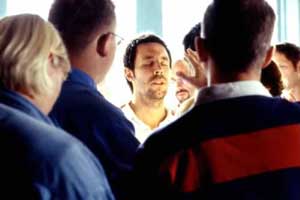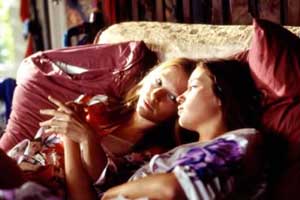-
- U.S. reaches disappointing milestone in AIDS epidemic
- Efforts intensify to end ban on openly gay soldiers
- Conservative Salt Lake City has surprisingly high gay population
- Mass. same-sex marriage initiative expected to change dynamics of debate
- Sex, lies and schools in ‘The Education of Shelby Knox’
- Iowa Supreme Court refuses to tamper with termination of civil ruling
- National News Briefs
- World News Briefs
Arts & Entertainment
To the point
An interview with
Emily Blunt
Published Thursday, 23-Jun-2005 in issue 913
As the troubled rich girl Tamsin in My Summer of Love, the new movie by Paul Pavlikovsky (The Last Resort), young British actress Emily Blunt has her work cut out for her. First, she has to hold her own against Nathalie Press, who plays her summer love interest, the irreverent yet charismatic Mona. She also has to make a potentially unlikable character agreeable to audiences from all walks of life.
Gay & Lesbian Times: Early in the movie, we learn that Tamsin was suspended from boarding school “for being a bad influence on people.” What was it like to play a bad influence?
Emily Blunt: It was great! Because I was a bit of a goody-two-shoes at school. I was never Tamsin, I was always the geek following her around, desperate for her to smile on me. So I guess it was great to play someone like that who is troubled, who has such a pretentious quality to her. But you’ve got to love her; you’ve got to find her magnetic. It’s a challenge to play pretentious people, I think. You can’t have the audience hating her. You have to see moments where she’s generous and warm. It was great to play someone with an eccentricity about her.
GLT: She is magnetic. It’s easy to understand their attraction.
EB: Yes.
GLT: So you’ve never been a bad influence on anyone?
EB: Not really. I’d love to be exciting and say that I was the rebel at school, but sadly, I wasn’t.
GLT: In addition to being a bad influence, Tamsin calls herself “a fantasist.” As an actress, do you think being a fantasist is a necessary skill?
EB: In a funny way, I think it’s the complete opposite. I think it’s about being a realist and being true to yourself and your instincts and emotions; rather than it becoming a façade. With Tamsin, it’s all façade. She has kind of a frightening imagination. You have to have that as an actress. You have to be able to touch on those experiences that you haven’t had and characters that you have no relation to. It’s important to be able to dig deep, but I think it’s about being very real with yourself more than anything.
GLT: There’s a wonderful scene where Tamsin and Mona are listening to Edith Piaf, which leads Tamsin to describe some of the aspects of Edith Piaf’s troubled love life, saying that “in France, crimes of passion are forgiven.” In a sense, what Tamsin does to Mona is something of a crime of passion. Would you agree with that?
EB: It’s just some kind of elaborate game that she’s been playing, I think, more so than that she’s compassionate about Mona. I think she finds in Mona what she lacks in herself. In a funny way, they each need the other. I think it’s more of a crime of boredom for Tamsin. She’s bored and lost, and she knows that she has all of these abilities to draw people in, and she’ll use them to discover her own self-worth; which is kind of a dangerous and uncompassionate game to play. More than a crime of passion, I think it’s just a teenage fantasy.
GLT: With that in mind, do you think crimes of passion should be forgiven?
EB: When you’re in love, you completely lose sight of everything. You can’t think straight. When you’re passionate about something there is that feeling that you want to rip it out of your brain. So, I don’t know. I think there should be some psychological forgiveness for that [laughs].
GLT: In keeping with that, My Summer Love also offers an up-close look at obsessive love. Have you ever been obsessed with someone, and if so, did it end well?
EB: I’ve definitely been in love. I’ve definitely invested so much in another person that I would put them before myself. I think that can be a dangerous game to play because you don’t look after yourself so much. I think it’s important that there is a quality of self-contentment in a relationship. But I know what it feels like to… it’s all encompassing.
GLT: My Summer of Love is being released at a time when there are a number of excellent queer-themed movies hitting theaters. How does it feel as an actress to be swept up in this “queer cinema revival?”
EB: It’s funny because I never saw myself being swept up by that. There’s sort of been a label that’s been attached to the film, but it was never what the film was about. It wasn’t a religious political stance, nor was it a gay versus religion [film]. There’s such a simplicity to the film, and what people have really responded to is the relationship between the two girls, not so much the sexual encounter. We’ve all had friends like that. So I guess when I accepted the role, and during and after the movie, it’s sort of been a side effect of everything that I thought the movie was about. In England, people’s reactions have been different than over here [in the states]. People want to stamp labels on movies here; maybe to sell it, I’m not sure.
GLT: But are you prepared to become a gay icon?
EB: Me? Am I? [laughs] I don’t know what will happen.
GLT: The movie also takes a close look at religious fundamentalism. Do you have an opinion about the religious fanaticism, which appears to be on the rise the world over?
EB: It’s funny, because in the U.K., which is what I know because it’s where I grew up, it’s more of a parochial thing that’s going on there. It’s not so politicized. It doesn’t have the same power or resonance that it has over here. I would say that I’m Christian, but I wouldn’t say that I’m particularly religious in any way. I think that the people that I met on the movie – and they were real born-again Christians – seemed very sorted, as if God had dropped in their laps and suddenly everything was fine. I don’t know what I feel about that.
GLT: Had you seen Last Resort or any of Paul Pavlikovsky films before working with him?
EB: Yes, and I saw his short film Twockers. I haven’t seen any of his documentaries. I loved The Last Resort. He just loves people and characters and stories, as long as he casts well and finds people who will work with him. He can tease a lot out of actors. I think that’s the main thing. You fall in love with his rather layered people. Life is ambiguous, isn’t it? It’s never as black and white as you see it in the movie. Because Paul has had such experience with documentaries, he knows what rings true, and that’s why his movies move people.
|
|
Copyright © 2003-2025 Uptown Publications




